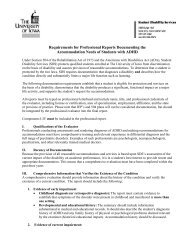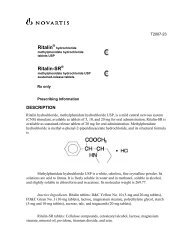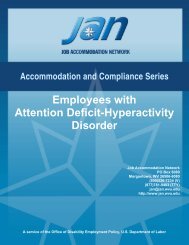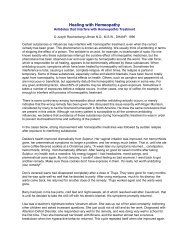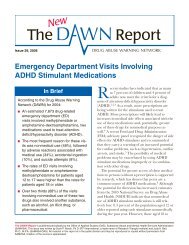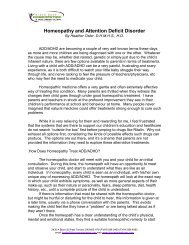Documentation Requirements for Attention ... - ADHD Info Centre
Documentation Requirements for Attention ... - ADHD Info Centre
Documentation Requirements for Attention ... - ADHD Info Centre
Create successful ePaper yourself
Turn your PDF publications into a flip-book with our unique Google optimized e-Paper software.
In<strong>for</strong>mation Processing<br />
• Detroit Tests -of Learning Aptitude - 3 (DTLA-3)<br />
• Detroit Tests of Learning Aptitude - Adult (DTLA-A).<br />
• In<strong>for</strong>mation from subtests on WAIS-R or Woodcock-Johnson Psychoeducational Battery -<br />
Revised: Tests of Cognitive Ability, as well as other relevant instruments, may be useful<br />
when interpreted within the context of other diagnostic in<strong>for</strong>mation.<br />
4. Identification of DSM-IV Criteria<br />
According to the DSM-IV, "the essential feature of <strong>ADHD</strong> is a persistent pattern of inattention<br />
and/or hyperactivity-impulsivity that is more frequent and severe than is typically observed<br />
individuals at a comparable level of development" (p. 78). A diagnostic report should include a<br />
review and discussion of the DSM-IV criteria <strong>for</strong> <strong>ADHD</strong> both currently and retrospectively and<br />
specify which symptoms are present (see DSM-IV <strong>for</strong> complete criteria).<br />
In diagnosing <strong>ADHD</strong>, it is particularly important to address the following criteria:<br />
• symptoms of hyperactivity/impulsivity or inattention that cause impairment that must<br />
have been present in childhood;<br />
• current symptoms that have been present <strong>for</strong> at least the past six months;<br />
• impairment from the symptoms present in two or more settings (<strong>for</strong> example, school,<br />
work, home);<br />
• clear evidence of significant impairment in social, academic, or occupational<br />
functioning*; and<br />
• symptoms that do not occur exclusively during the course of a Pervasive<br />
Developmental Disorder, Schizophrenia, or other Psychotic Disorder and are not better<br />
accounted <strong>for</strong> by another mental disorder (e.g., Mood Disorder, Anxiety Disorder,<br />
Dissociative Disorder, and a Personality Disorder).<br />
IV.<br />
<strong>Documentation</strong> Must Include a Specific Diagnosis<br />
A. The report must include a specific diagnosis of the disability. The diagnostician should use<br />
direct language in the diagnosis of the disability, avoiding such terms as "suggest" or "is<br />
indicative of”.<br />
B. The report must include a specific diagnosis of <strong>ADHD</strong> based on the DSM-IV diagnostic<br />
criteria.<br />
C. The diagnostician should use direct language in the diagnosis of <strong>ADHD</strong>, avoiding the use of<br />
such terms as "suggests ... .. is indicative of," or "attention problems."<br />
D. Individuals who report only problems with organization, test anxiety, memory or concentration<br />
in selective situations do not fit the prescribed diagnostic criteria <strong>for</strong> <strong>ADHD</strong>.



